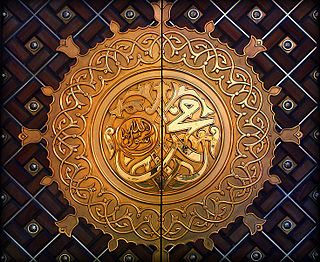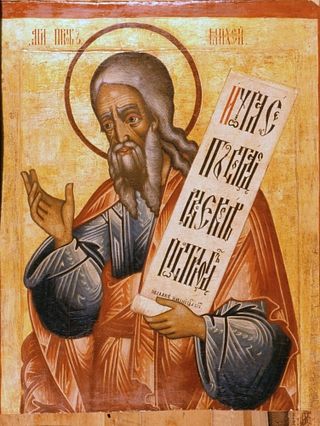
Isaiah was the 8th-century BC Israelite prophet after whom the Book of Isaiah is named.

Obadiah, also known as Abdias, is a biblical prophet. The authorship of the Book of Obadiah is traditionally attributed to the prophet Obadiah.

In religion, a prophet or prophetess is an individual who is regarded as being in contact with a divine being and is said to speak on behalf of that being, serving as an intermediary with humanity by delivering messages or teachings from the supernatural source to other people. The message that the prophet conveys is called a prophecy.

Jeremiah, also called Jeremias or the "weeping prophet", was one of the major prophets of the Hebrew Bible. According to Jewish tradition, Jeremiah authored the book that bears his name, the Books of Kings and the Book of Lamentations, with the assistance and under the editorship of Baruch ben Neriah, his scribe and disciple.

Anne Hutchinson was a Puritan spiritual advisor, religious reformer, and an important participant in the Antinomian Controversy which shook the infant Massachusetts Bay Colony from 1636 to 1638. Her strong religious formal declaration were at odds with the established Puritan clergy in the Boston area and her popularity and charisma helped create a theological schism that threatened the Puritan religious community in New England. She was eventually tried and convicted, then banished from the colony with many of her supporters.

Mūsā ibn ʿImrān is a prominent prophet and messenger of God and is the most frequently mentioned individual in the Quran, with his name being mentioned 136 times and his life being narrated and recounted more than that of any other prophet. He is one of the most important prophets and messengers of Islam.

Richard Brome ; was an English dramatist of the Caroline era.

William Marrion Branham was an American Christian minister and faith healer who initiated the post-World War II healing revival, and claimed to be a prophet with the anointing of Elijah, who had come to prelude Christ's second coming; some of his followers have been labeled a "doomsday cult". He is credited as "a principal architect of restorationist thought" for charismatics by some Christian historians, and has been called the "leading individual in the Second Wave of Pentecostalism." He made a lasting influence on televangelism and the modern charismatic movement, and his "stage presence remains a legend unparalleled in the history of the Charismatic movement". At the time they were held, Branham's inter-denominational meetings were the largest religious meetings ever held in some American cities. Branham was the first American deliverance minister to successfully campaign in Europe; his ministry reached global audiences with major campaigns held in North America, Europe, Africa, and India.
The Muggletonians, named after Lodowicke Muggleton, were a small Protestant Christian movement which began in 1651 when two London tailors announced they were the last prophets foretold in the biblical Book of Revelation. The group grew out of the Ranters and in opposition to the Quakers. Muggletonian beliefs include a hostility to philosophical reason, a scriptural understanding of how the universe works and a belief that God appeared directly on Earth as Jesus Christ. A consequential belief is that God takes no notice of everyday events on Earth and will not generally intervene until it is meant to bring the world to an end.

In religion, a false prophet or pseudoprophet is a person who falsely claims the gift of prophecy or divine inspiration, or to speak for God, or who makes such claims for evil ends. Often, someone who is considered a "true prophet" by some people is simultaneously considered a "false prophet" by others, even within the same religion as the "prophet" in question. In a wider sense, it is anyone who, without having it, claims a special connection to the deity and sets themself up as a source of spirituality, as an authority, preacher, or teacher. Analogously, the term is sometimes applied outside religion to describe someone who fervently promotes a theory that the speaker thinks is false.

Ad-Dajjal, otherwise referred to simply as the Dajjal, is an evil figure in Islamic eschatology who will pretend to be the promised Messiah and later claim to be God, appearing before the Day of Judgment according to the Islamic eschatological narrative. The word Dajjal is not mentioned in the Quran, but he is mentioned and described in the Hadith. Corresponding to the Antichrist in Christianity, the Dajjal is said to emerge out in the East, although the specific location varies among the various sources.
Tawassu, is an Arabic word originated from 'wasilat'. The wasilah is a means by which a person, goal or objective is approached, attained or achieved. In another version of the meaning of tawassul in another text: Tawassul is an Arabic word that comes from a verbal noun, wasilah, which according to Ibn Manzur in Lisān al-'Arab means "a station of King, a rank, or act of devotion". In other words, it refers to a position of power due to one's proximity to the king or sovereign. While the tawassul or tawassulan is the use of wasilah for this purpose. In religious contexts, the tawassul is the use of a wasilah to arrive at or obtain favour of Allah.

In Islam, Muḥammad is venerated as the Seal of the Prophets and earthly manifestation of primordial divine light (Nūr), who transmitted the eternal word of God (Qur'ān) from the angel Gabriel (Jabrāʾīl) to humans and jinn. Muslims believe that the Quran, the central religious text of Islam, was revealed to Muhammad by God, and that Muhammad was sent to guide people to Islam, which is believed not to be a separate religion, but the unaltered original faith of mankind (fiṭrah), and believed to have been shared by previous prophets including Adam, Abraham, Moses, and Jesus. The religious, social, and political tenets that Muhammad established with the Quran became the foundation of Islam and the Muslim world.
Queen Henrietta's Men was an important playing company or troupe of actors of the Caroline era in London, England. At their peak of popularity, Queen Henrietta's Men were the second leading troupe of the day, after only the King's Men.

According to the Hebrew Bible, Micah, also known as Micheas, was a prophet in the Bible and is the author of the Book of Micah. He is considered one of the Twelve Minor Prophets of the Hebrew Bible and was a contemporary of the prophets Isaiah, Amos and Hosea. Micah was from Moresheth-Gath, in southwest Judah. He prophesied during the reigns of kings Jotham, Ahaz, and Hezekiah of Judah.
Richard Farnham, was an English self-proclaimed "prophet", who claimed, with John Bull, to be one of the witnesses spoken of in the Book of Revelation, xi. 3.

According to the Islamic doctrine, Zakariyā is a prophet of God, and the father of the prophet Yahya.

Jeremiah 28 is the twenty-eighth chapter of the Book of Jeremiah in the Hebrew Bible or the Old Testament of the Christian Bible. The material found in Jeremiah 28 of the Hebrew Bible appears in Jeremiah 35 in the Septuagint. This book contains prophecies attributed to the prophet Jeremiah, and is one of the Books of the Prophets. This chapter contains a confrontation between prophets Jeremiah and Hananiah: Hananiah's false prophecy is responded by Jeremiah's answer, Jeremiah 28:1-9. Hananiah breaks Jeremiah's yoke, Jeremiah foretells an iron yoke, and Hananiah's death, Jeremiah 28:10-17.
Rose Thurgood was an English religious writer, known as the author of one of the earliest English conversion narratives, "A Lecture of Repentance" (1637/8).
Cicely Johnson was an English woman living in Colchester. Her account of her conversion while under the influence of John Bull and Richard Farnham was discovered in John Rylands University Library in Manchester hundreds of years after she wrote it, in about 1636/7.













